11 Stair Measuring Tools for Fast, Safe, & Accurate Work
Author: Omar Alonso | Editor: Omar Alonso
Review & Research: Jen Worst & Chris Miller
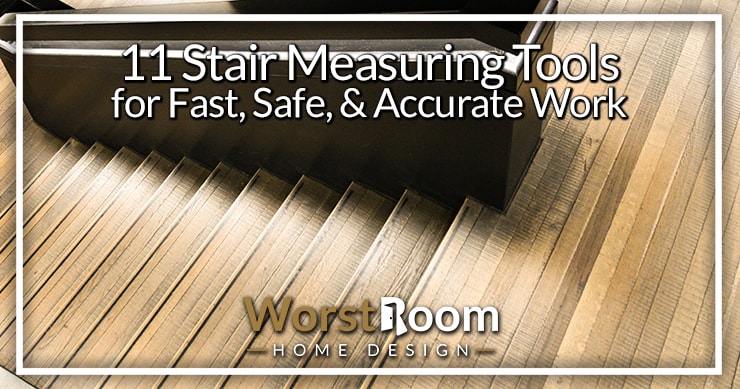
Stair measuring tools are some of the most important but least celebrated devices in our garages. Construction crews and home owners alike will all use these eventually and come to understand just how much they matter.
Stairs are one of the most important structural elements in any multi-storied building. Even if you're on the ground floor, stairs can be incorporated in different parts of the space to add levels or to make certain areas more accessible.
But while their importance can't be stated enough, the importance of their safety is also something that needs to be discussed and emphasized.
11 Stair Measuring Tools
If stairs are crooked or uneven, they could lead to serious—often fatal—accidents. You don't want an elderly person or a child tripping on a set of badly constructed stairs. If you've undertaken a building task on your own, nothing can be more frustrating than to find the stairs are not right.
But with the right types of tools, you can ensure you have built the perfect set of stairs. The following are the stair measuring tools that you can use.
1) Construction Calculator
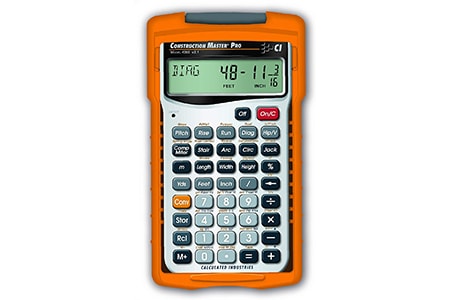
A construction calculator is perhaps the most confusing entry on this list. How could a calculator be helpful in measuring stairs? Measuring stairs is an activity that involves mathematics and a calculator is just the tool you need for that.
A construction calculator is a specific tool that will help you get a lot of measurements accurate to the very last detail. It also has built-in data of some of the standard building calculations which makes it easier to get measurements around a construction site and thus saving a lot of time.
While building stairs, you will need to have various types of measurements and numbers in mind. Having the construction calculator will make it easier to crunch those final numbers for the stair measurement.
2) Square
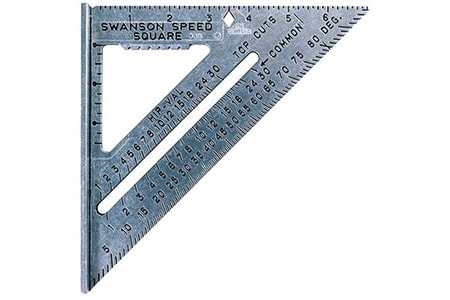
A square is a tool that most good carpenters can't do without. Apart from measuring stairs, a square (especially a speed square) is useful for practically every kind of measurement that may be useful for carpentry.
If there's one thing to know when you're building stairs, it's that you can't go wrong with the measurement. A square will ensure that you get the right numbers (and right angles). There's so much you can do with a speed square, with many tricks to understand.
While squares aren't specific to measuring stairs alone, much like the construction calculator, it's useful for getting accurate measurements of all kinds. A compact square can also fit into your pocket easily and is a helpful tool to have at all times.
3) Stair Step Scribe
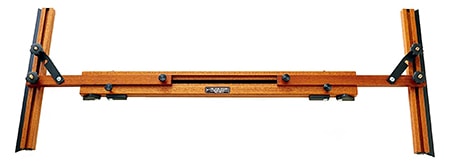
A stair step scribe is a tool that is especially useful while building stairs. One of the most frustrating things, after you have finished a construction project, is to find that the stairs are uneven.
With a stair step scribe, you'll be able to get accurate and exact measurements before you start building the stairs—which is when it really matters. And this tool is very easy to use.
You only have to open out the arms and place them on the edge of the stairs to get an accurate measurement. An exact measure will save you the trouble later and you also won’t waste your materials following the wrong measurement.
4) Multi-Angle Ruler
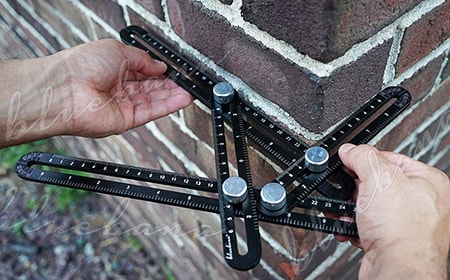
When you're working on stairs, it's obvious that there are multiple angles and measurements involved. When you have to measure so many angles and sides, you'll need to keep repositioning a regular ruler, which may be very inconvenient.
However, with a multi-angle ruler, you'll be able to get all these measurements without risking losing the earlier point because of repositioning. Though seemingly basic, this is one of the best stair measuring tools available.
A multi-angle ruler allows you to position it into the shape of the stairs by moving the levers around. It'll save you a lot of time and will make the whole process a lot more efficient.
5) Level

A level is a very useful tool to ensure that you are able to install your stairs in a clean and even way. If the stairs are uneven, they're not safe for use—especially if there are elderly people or children living in the house.
A level will be able to tell you if the stairs are flat or if you need to make adjustments. Levels usually have a glass tube that contains some kind of liquid and air bubbles which indicate the incline of a horizontal surface. There are many types of levels you can explore, including line levels, laser levels, and more.
You simply place the level on the top of the step. If there's a slant, the step and the level will not align and you know you need to rectify the gap. This is a tool you can use throughout while you're building the stairs so that you can keep each step in check.
6) Laser Distance Measure
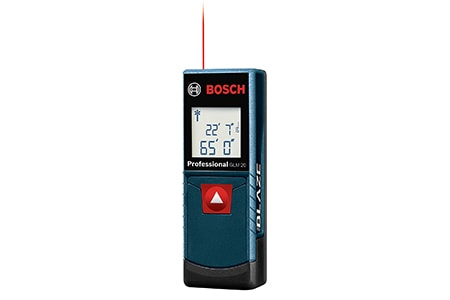
A laser distance measure tool is a very exciting and efficient tool to use in construction. This is a useful stair tread measuring tool that measures how far in the distance the object the laser is pointing to is.
While there are cheaper methods you can use to measure stairs, this is a highly accurate and modern method of doing it. A laser distance measure tool is also very simple to use, especially for marking where you'll be using whatever types of saws you have to cut the boards to length for the right stair depth.
You simply have to point it at the top of the stairs or to the point that you want to measure from. When you turn it on, the laser beam will give you the measurement you are looking for.
7) Stair Tread Gauge
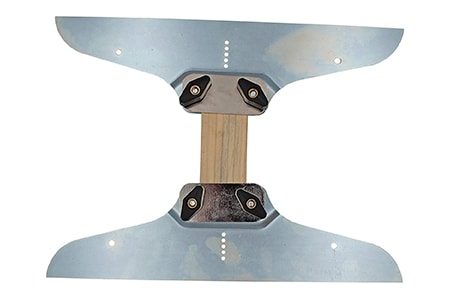
Building stairs can be made much easier when you have a stair tread template gauge. What’s more, the tool can be used for a variety of things other than constructing stairs as well, such as building bookshelves and putting together other types of furniture.
While a stair tread gauge isn't the first tool people think of when it comes to measuring stairs, it certainly is a much easier tool to use compared to a tape measure or even a compact square. This is because it allows you to cover multiple steps in the measuring process at once.
8) L-Square
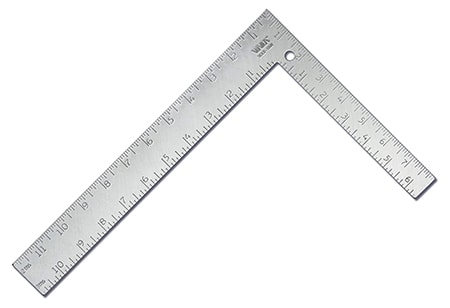
While the square has been covered above, an L-square is even more useful for measuring stairs. An L framing square will allow you to measure the rise at the right angle more accurately.
For any types of staircases, you need to measure the top of the stairs as well as the rise. An L-square will work as a regular ruler as well but will give you more information while measuring stairs, speeding everything up drastically.
9) Calipers
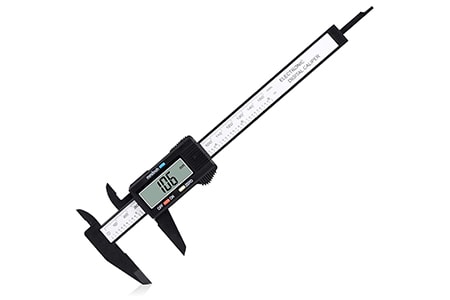
Calipers are a measuring tool that most old school carpenters are likely to have. This is the perfect tool to measure the distance between two points—something that is very useful when you are building stairs. They're probably the oldest of the more advanced stair measuring tools.
A good set of calipers will allow you to measure the thickness of materials and determine how they'll affect the measurement you have in mind for your stairs.
You can make your measurements, marking each off with whatever types of tape you have on hand, and then make the cuts all at once. It's all about saving time.
Nowadays, there are also digital calipers that will give you a reading of the distance so you don't have to do it manually. This makes your work even simpler.
10) Pitch & Slope Locator
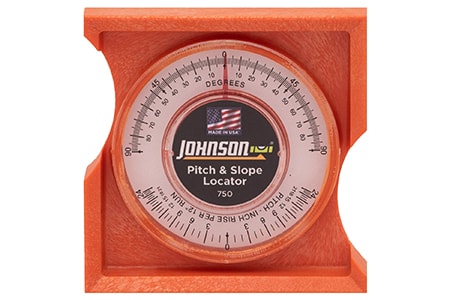
Again, while you're building stairs the question of safety cannot be asserted enough. Staircases are inherently dangerous structures and all sorts of provisions must be taken to prevent accidents.
The level, pitch, and slope of the stairs need to be accurate and in tandem so no untoward incidents take place. Apart from determining the slope of your stairs, you can also use this tool to measure the pitch of your roof.
This is also a tool that will give you an accurate measure of angles in a certain area. In other words, this is one of the most versatile tools you can have while you are building stairs or carrying out any other construction work around the house. It also does not cost too much money and is a durable tool to invest in.
11) Tape Measure
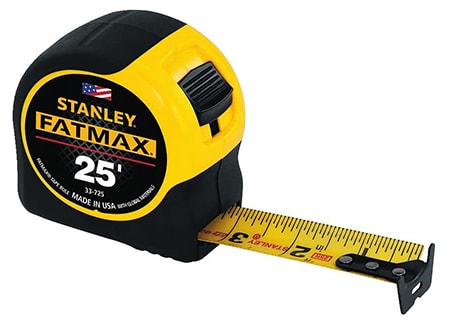
Finally, saving the most obvious tool for last, a tape measure is something no construction worker or carpenter worth their salt will work without.
Though many of the tools that have been mentioned above can be more efficient for measuring stairs, tape measures are essential to have in your tool kit when you are building anything.
Tape measures are a fundamental way to measure things. Even if you don't rely on them as the primary tool to take measurements of the stairs, they can be used to supplement other tools so you can get a second reading and double check the accuracy of your measurement.
Stair Measuring Tools Are a Must
The stair measuring tools that have been mentioned and described above are all easily available to find in hardware stores or online. None of them are too extravagantly priced, though some may be more expensive than others.
With the right kind of tools, you'll be able to ensure accurate measurements for stairs. When you start off with the right measurements, you can keep returning to these numbers and calculations to ensure that you are on track.
When the foundation of your measurements and calculations is correct, you will be able to build safe and even stairs. And all of that hinges on your access to, and skill in using, stair measuring tools.



